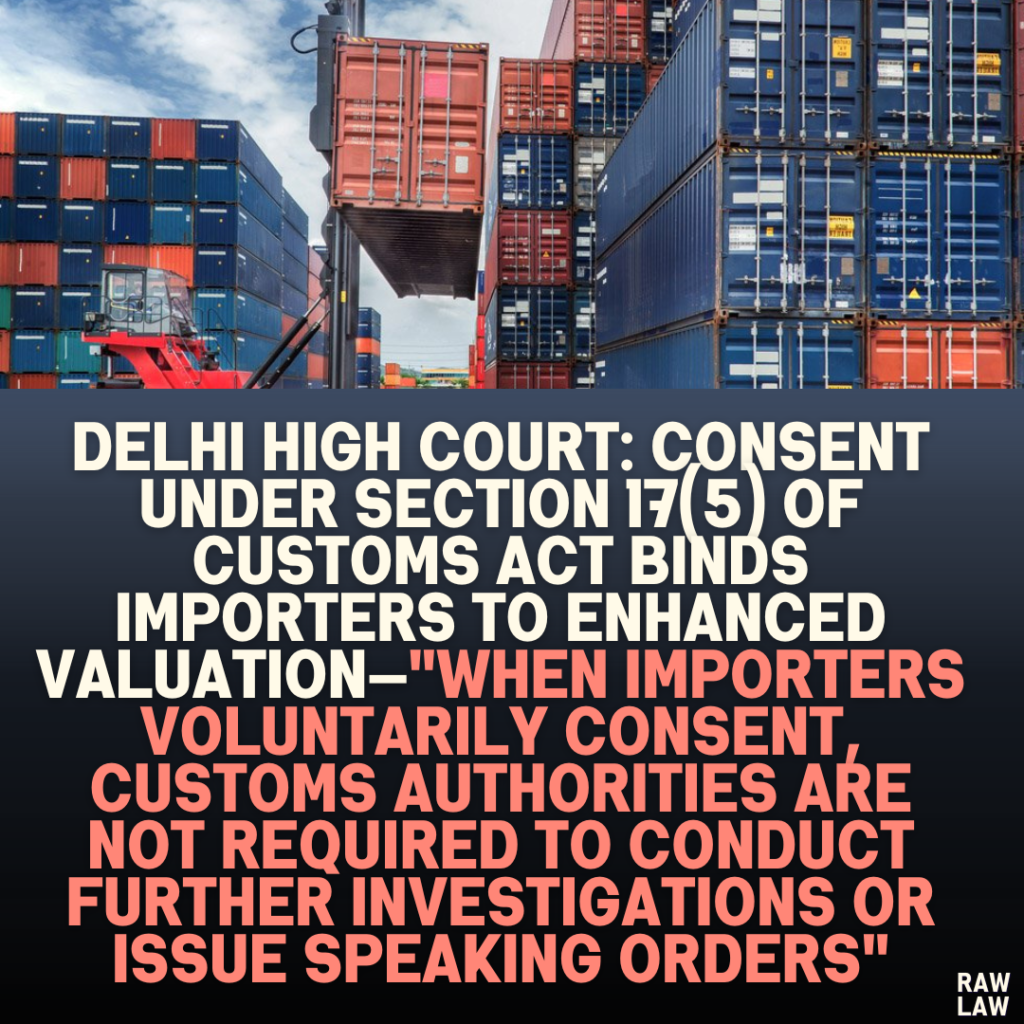Court’s Decision:
The Delhi High Court upheld the Customs, Excise & Service Tax Appellate Tribunal (CESTAT) decision, holding that when an importer provides written consent to a reassessment under Section 17(5) of the Customs Act, 1962, they waive their right to challenge the reassessment, including the enhanced valuation. The court found that such consent eliminates the requirement for the customs authorities to provide further justifications or a speaking order.
Facts:
- Transaction Details:
- The case involved importers who self-declared the transaction value of goods during customs clearance as required under Section 17(1) of the Customs Act.
- Customs authorities doubted the declared value based on contemporaneous import data from the National Import Database (NIDB).
- Reassessment and Consent:
- Customs officials proposed reassessment and communicated their findings to the importers.
- Facing potential delays and financial losses from detention and demurrage charges, the importers consented in writing to the enhanced valuation.
- The consent letters explicitly waived the importers’ right to request a show-cause notice, speaking order, or hearing, allowing customs officials to finalize the assessment without further proceedings.
- Subsequent Challenge:
- After paying additional customs duties on the reassessed value, the importers appealed the reassessments, alleging procedural and substantive irregularities, particularly regarding the use of NIDB data and the lack of a speaking order.
Issues:
- Waiver of Rights:
- Can an importer who consents under Section 17(5) later challenge the reassessment or enhanced valuation?
- Validity of NIDB Data:
- Is NIDB data a sufficient basis for customs officials to reject the declared value and enhance the valuation?
- Speaking Order Requirement:
- Must customs authorities pass a speaking order even when the importer consents to the reassessment?
Petitioner’s Arguments:
- Challenge to Reassessment:
- The importers contended that the reassessment was arbitrary and lacked sufficient reasoning as required by Rule 12 of the Customs Valuation (Determination of Value of Imported Goods) Rules, 2007.
- They argued that NIDB data alone could not justify the rejection of their declared value.
- Procedural Non-Compliance:
- The absence of a speaking order or detailed justification for the reassessment violated procedural requirements under Section 17(5) and Rule 12.
Respondent’s Arguments:
- Voluntary Consent:
- Customs officials argued that the importers had voluntarily accepted the enhanced valuation and explicitly waived their right to contest it.
- No Procedural Breach:
- Once the importers consented to the reassessment, there was no obligation to pass a speaking order under Section 17(5).
- The reassessment was validly based on contemporaneous import data and consistent with statutory provisions.
Analysis of the Law:
- Section 17 of the Customs Act:
- Subsection (1): Importers must self-assess the value of imported goods.
- Subsection (4): Customs officials may reassess the value if they find the self-assessment incorrect, based on verification or testing.
- Subsection (5): If the reassessment differs from the self-assessment, customs must pass a speaking order unless the importer explicitly waives this requirement by consenting to the reassessment.
- Rule 12 of Customs Valuation Rules, 2007:
- Requires customs authorities to have “reasonable doubt” about the declared value to reject it.
- Proper officers must request additional information from the importer and provide a chance to explain before finalizing the reassessment.
- Judicial Precedents:
- In Advanced Scan Support Technologies and Vikas Spinners, the courts held that consent to reassessment precludes any subsequent challenge, as the importer waives their right to dispute the enhanced value.
- The Eicher Tractors and Century Metal Recycling cases emphasized procedural fairness but did not apply here due to explicit consent.
Precedent Analysis:
- Binding Consent:
- Past cases affirmed that when importers voluntarily consent to an enhanced valuation, the customs authorities are not required to conduct further investigations or issue speaking orders.
- The consented value becomes the declared transaction value, ending the need for additional scrutiny or justification.
- Role of NIDB Data:
- The court upheld the validity of using NIDB data for reassessment, especially when supported by the importer’s consent.
Court’s Reasoning:
- Impact of Consent:
- Written consent under Section 17(5) signifies agreement with the reassessment, including enhanced valuation, and negates the right to a speaking order or appeal.
- By consenting, the importers acknowledged the accuracy of the reassessed value and waived their right to dispute it.
- Procedural Compliance:
- Since the importers explicitly waived their right to procedural safeguards (e.g., a show-cause notice or hearing), customs officials were not obligated to provide additional justification or pass a speaking order.
- Use of NIDB Data:
- The court clarified that the reassessment was not solely based on NIDB data but was validated by the importers’ written consent.
Conclusion:
The court affirmed CESTAT’s decision, ruling that:
- Consent under Section 17(5) binds the importer to the reassessment and precludes further legal challenges.
- Customs officials are not required to pass a speaking order or justify the reassessment once the importer consents.
Implications:
- For Importers:
- Importers must carefully evaluate the implications of consenting to reassessments, as it may waive their right to procedural safeguards and legal remedies.
- For Customs Authorities:
- Consent from importers simplifies the valuation process, eliminating the need for detailed investigations or justifications.
- Legal Precedence:
- This judgment reinforces the principle that consent under Section 17(5) limits the scope of challenges, ensuring efficiency in customs valuation.
This case serves as a critical reminder of the importance of informed decision-making in customs procedures and highlights the binding nature of consent under Section 17(5).




Pingback: Delhi High Court Upholds Arbitral Award Under Arbitration Act, 1940: Affirms Limited Judicial Interference, Arbitrator’s Jurisdiction, and Defendant’s Liability for Breaches in Sub-Contract - Raw Law